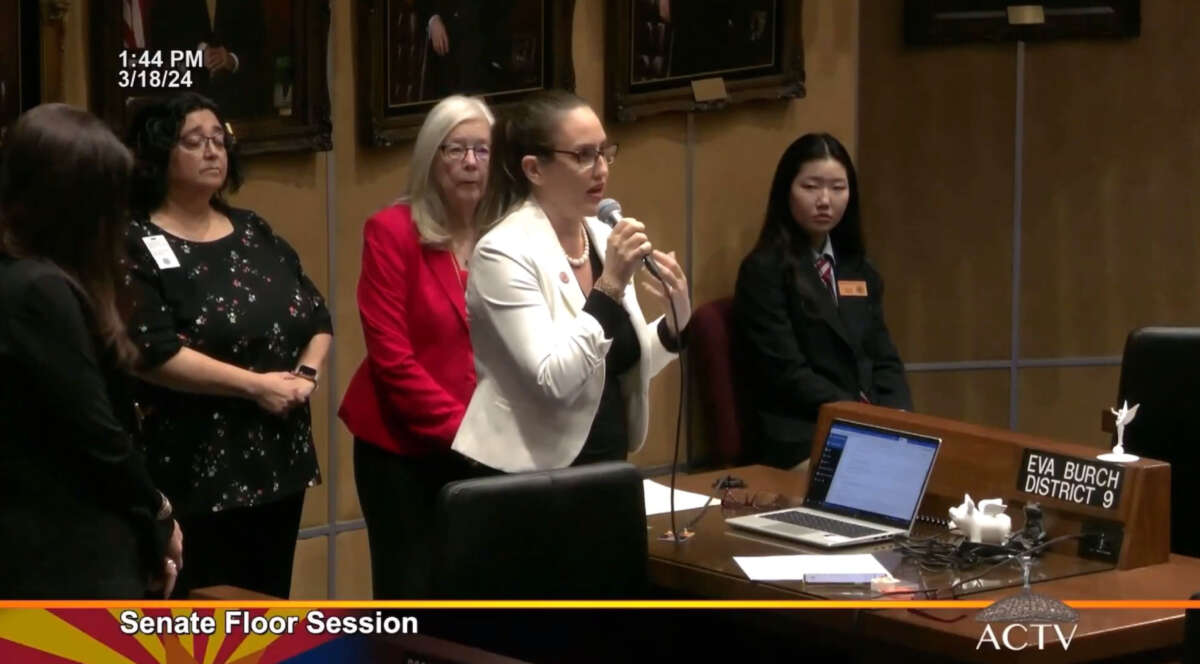Honest, paywall-free news is rare. Please support our boldly independent journalism with a donation of any size.
An Arizona state legislator announced her plans to obtain an abortion during an impassioned speech that criticized the state’s restrictive laws on reproductive care as burdensome and harmful.
State Sen. Eva Burch (D) made the speech before her legislative colleagues on the Arizona Senate floor on Monday. Having experienced multiple miscarriages in the past, the mother of two explained why she made the choice to abort her current pregnancy, which has become nonviable.
“I don’t think people should have to justify their abortions,” Burch, a former nurse practitioner, said during her speech. “But I’m choosing to talk about why I made this decision because I want us to be able to have meaningful conversations about the reality of how the work that we do in this body impacts people in the real world.”
Burch said she found out she was pregnant a few weeks ago. But when she and her husband discovered the pregnancy was no longer viable, they decided an abortion was the proper choice for her own health.
Such decisions “can often be the right health care choice” for individuals for a number of reasons, she explained in her speech, elaborating that she was “not interested in going through” another miscarriage unnecessarily.
“Right now, the safest and most appropriate treatment for me, and the treatment that I choose, is abortion,” the Arizona state senator added.
However, Burch said that state laws made the decision making process burdensome and dangerous.
Burch explained how those laws “interfered” with her desired action. Stating that she sought abortion care on Friday, Burch was told by her doctor that she had to receive an unnecessary and “invasive” transvaginal ultrasound under state law. The doctor was also required to recite “factually false” information about abortion before proceeding, Burch added.
The Arizona lawmaker also had to wait 24 hours before she could get an abortion. As of Monday, she was still pregnant, she told her colleagues.
“The only reason I had to hear those things was a cruel and uninformed attempt by outside forces to shame and coerce and frighten me into making a different decision other than the one I knew was right for me,” Burch said. “There’s no one-size-fits-all script for people seeking abortion care, and the legislature doesn’t have any right to assign one.”
Burch also acknowledged that individuals pregnant beyond the state’s current 15-week limit face an even more excruciating process, including traveling out of state if the procedure isn’t necessary for survival.
The lawmaker called on lawmakers to change laws on abortion care in the state. Failing that, voters should replace anti-abortion lawmakers with better alternatives, she said.
“Our decision-making should be grounded in expert testimony and in consensus from both the medical community and from constituents, and free from political posturing and partisan bias. But that’s not what I see happening,” Burch explained. “So, I truly hope that Arizonans have the opportunity to weigh in on abortion on the ballot in November.”
The future of abortion rights in Arizona is uncertain. Currently, the state Supreme Court is considering whether to reinstate an 1864 territorial law that would prohibit abortion at all stages of pregnancy. Had that statute been in place a week ago, Burch wouldn’t have been able to obtain an abortion unless her pregnancy posed a severe risk to her life.
Meanwhile, reproductive rights activists are currently collecting signatures to place an abortion access ballot initiative before voters in the November election. The constitutional amendment proposal would establish a “fundamental right to abortion” that would mean the state couldn’t “deny, restrict or interfere” with abortion before fetal viability as determined by a health care provider, usually understood to be around 20-25 weeks. The amendment would also grant abortion exceptions beyond that point to “protect the life or the physical or mental health of a pregnant individual.”
Media that fights fascism
Truthout is funded almost entirely by readers — that’s why we can speak truth to power and cut against the mainstream narrative. But independent journalists at Truthout face mounting political repression under Trump.
We rely on your support to survive McCarthyist censorship. Please make a tax-deductible one-time or monthly donation.
